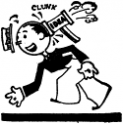Smart
Ow, my brains!
Dear Word Detective: I often have heard, and have used, the term “smart,” in reference to hurting, as in “Boy, that really smarts.” Is this in any way related to “smart” as an assessment of one’s knowledge? — Van Neie.
 As in “I guess trimming my toenails with tin snips wasn’t very smart, because this really smarts”? Good question, and the fact that a sentence like that wouldn’t set off alarm bells in most of our noggins is a tribute to the remarkable ability of the English language to use what appears to be the same word to mean two very different things. Or maybe it means that we’re just not really paying close attention to what we say.
As in “I guess trimming my toenails with tin snips wasn’t very smart, because this really smarts”? Good question, and the fact that a sentence like that wouldn’t set off alarm bells in most of our noggins is a tribute to the remarkable ability of the English language to use what appears to be the same word to mean two very different things. Or maybe it means that we’re just not really paying close attention to what we say.
It wouldn’t be surprising to learn that “smart” (learned) and “smart” (pain) are actually two different words from unrelated sources. English is full of such homonyms, words spelled (and often pronounced) the same but with different meanings and different origins. One classic example is the word “fluke,” which can mean a kind of flounder-like fish, the fins on a whale’s tail, the pointy bits on the end of a ship’s anchor, or a stroke of good luck. All those “flukes” come from different sources; English evolved “fluke” four separate times, much as the wings of bats evolved entirely independently from those of birds.
“Smart,” however, is one of those cases where the two primary senses, even though they seem hard to connect to each other, share a common origin. “Smart” meaning “hurt” is actually the grandparent of “smart” meaning “on the ball.” It’s the same word.
The source of “smart” is the prehistoric Germanic root word “smert,” which meant “to be painful; to hurt,” and which eventually produced our modern English “smart.” As a verb, “to smart” has always meant “to hurt,” usually literally, although later uses have invoked the word in a figurative sense (“The fact that it was his own mother who fingered him to the IRS was what really smarted”).
It was when “smart” the verb begat “smart” the adjective that things really started to get interesting. The earliest use of “smart” as an adjective was to mean literally “causing pain, stinging,” as one might speak of a “smart” lash with a whip. But by around 1300, “smart” was also being applied figuratively to “sharp” or “cutting” remarks (“He seldom failed of a smart word or two upon my littleness,” Swift, 1726). This led to “smart” being used to mean “strong, quick, intense” in manner, which led, by the 17th century, to the word being used to mean “clever,” “witty” or “knowledgeable.” The sense of “smart” people being quick, witty and fashionable led shortly thereafter to the use of “smart” to also mean “neatly attired” and “trim.”
Page 1 of 2 | Next page
